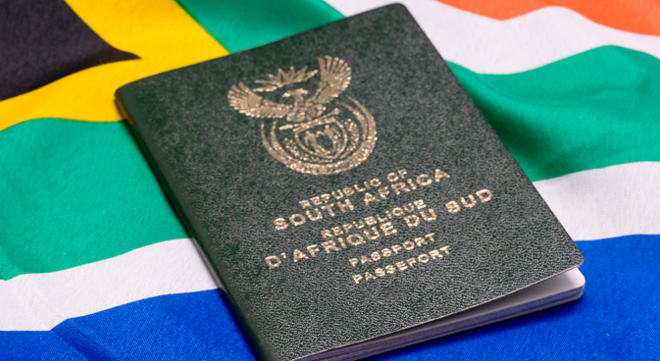The South African passport has risen three places in the 2023 instalment of the Henley Passport Index.
Released last week, the index showed that South Africa placed 52nd in a ranking of the world’s most powerful travel documents, up three places from last year’s 55th. Of the 227 travel destinations around the world, South Africans can now visit 106 of them, visa-free.
The Henley Passport Index is the original, authoritative ranking of all the world’s passports according to the number of destinations their holders can access without a prior visa. The index is based on data from the International Air Transport Association (IATA) – a travel information database – and enhanced by Henley & Partners’ research team.
When the index was first released in 2006, South Africa ranked 37th. In 2021, the country hit its lowest ranking yet, coming in at 58th.
A quick look at the top three passports shows that Japan has been knocked off the top spot for the first time in five years and bumped to third. The country shares this position with Austria, Finland, France, Finland, Luxembourg, South Korea, and Sweden (189 countries).
Singapore now boasts the world’s most powerful passport, with visa-free entry to 192 destinations.
In second place are the passports of Germany, Italy, and Spain (190 countries).
The three bottom countries are Syria (102nd with visa-free access to 30 countries), Iraq (103rd with visa-free access to 29 countries), and Afghanistan (104th with visa-free access to 27 countries).
Passport power
According to Henley & Partners, in addition to being a travel document that defines citizens’ freedom of movement, a strong passport provides significant financial freedom in terms of international investment and business opportunities.
In an insight titled “The Predictors of Passport Power”, Dr Juerg Steffen, the chief executive of Henley & Partners, writes that the general trend over the history of the 18-year-old index has been greater travel freedom, with the average number of destinations travellers can access visa-free nearly doubling from 58 in 2006 to 109 in 2023.
“However, the global mobility gap between those at the top and bottom of the index is now wider than it has ever been, with top-ranked Singapore able to access 165 more destinations visa-free than Afghanistan.”
Steffen says only eight countries have less visa-free access today than they did a decade ago.
“However, some nations have been far more successful than others in securing greater travel freedom for their citizens. The visa-policy space is very dynamic – one that is changing on an almost weekly basis. It is precisely this dynamism that has enabled Asian countries such as Japan, Singapore, and South Korea to ascend the Henley Passport Index ranking in recent years, while prominent countries in the Anglosphere have been on a steady decline, most notably, the UK and the USA, which jointly held first place on the ranking in 2014.”
Visa policy drivers
He says when it comes to governments securing visa waivers with other countries, the process is often set in motion by factors such as commonalities in their history and economic status, proactive foreign relations, and reciprocal agreements. In other words, countries tend to make travel easier for the citizens of states that have made travel and trade easier for their own citizenry.
“However, security concerns, religious, and cultural affiliations, and political alliances also come into play. There are many countries in the world that have wholesale bans on nationals of specific countries entering their borders or on their own citizens travelling to certain states due to security concerns or collapsed diplomatic relations (or because of one state’s non-recognition of the other).”
Another major driver of visa policy decisions, Steffen says, is the relative importance that a government places on tourism, including its annual targets for visitors.
The United Arab Emirates (UAE) has added 107 destinations to its visa-free score since 2013, resulting in a massive leap of 44 places on the index from 56th to 12th position with a score of 179.
“In the Middle East, we are seeing countries such as Qatar, Saudi Arabia, and the UAE heavily prioritising tourism as part of their long-term economic strategies (which relates to their shared objective of moving away from an overdependence on the oil sector), and this trend will see tourist-dependent states being more proactive about liberalising their internal visa policies.”
Of the countries that have fallen sharply over the past decade, most have been afflicted by conflict and economic crises. Gambia is an example. At the end of 2012, it was in 63rd place. Currently, it is in 71st place. Venezuela is the biggest faller overall, plunging 17 places, followed by Yemen, Syria, Nigeria, and North Korea.
“Our research showed that while citizens of upper middle- and high-income countries enjoy visa-free access to most destinations, citizens of lower middle- and low-income countries, as well as those with higher fragility scores, enjoy far less travel freedom because they are deemed to be high-risk when it comes to security, asylum, and overstay.”
Expert insights regarding the latest ranking are available in the Global Mobility Report 2023 Q3.




